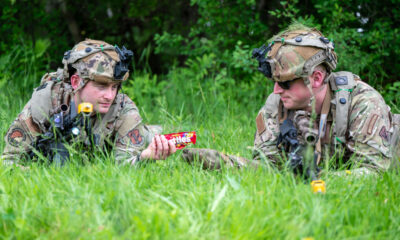Health
Neuroscientist Advocates for Flag Football Until Age 14

A prominent neuroscientist has issued a strong warning about the risks associated with youth tackle football, recommending that children should not participate in the sport until at least the age of 14. Chris Nowinski, co-founder of The Concussion Legacy Foundation, highlights a disturbing trend: many youth football coaches lack essential training in concussion management and safety protocols.
Nowinski emphasizes that the majority of youth coaches possess minimal knowledge regarding the fundamentals of football, as well as critical issues surrounding concussions and chronic traumatic encephalopathy (CTE). This brain disease is associated with repeated head injuries and has been increasingly recognized as a serious concern in contact sports. In a recent video, he illustrates the alarming practices some coaches employ, such as instructing players to avoid being “soft” by using large tackle props aimed at their heads.
In a direct appeal to parents considering youth football for their children, Nowinski raises crucial questions about the qualifications of coaches. “Would you be surprised to learn that the average youth football coach has never received training on how to coach football? Or how to diagnose a concussion?” he asks, underscoring the lack of oversight in youth sports leagues. He strongly advises parents to consider flag football as a safer alternative for children under 14, stating, “If you want to keep your child’s brain safer, choose flag football under 14.”
The concerns raised by Nowinski are compounded by a notable discrepancy: while the National Football League has acknowledged the reality of CTE, no youth football organization in the United States has publicly admitted the risks associated with the disease. This silence, Nowinski argues, stems from a desire to encourage early enrollment in football programs, potentially risking the long-term health of young athletes. He warns, “Don’t let them damage your child’s brain while it is going through important windows of development.”
Nowinski’s advocacy stems from personal experience. After suffering from post-concussion syndrome during his career as a professional wrestler with the WWE, he sought help from Dr. Robert Cantu, a leading expert on concussions. Nowinski credits Dr. Cantu with transforming his understanding of concussion management, noting that as both a college and professional athlete, he was never taught how to recognize or report concussions during his time playing football at Harvard University.
The consequences of CTE can be devastating. Research suggests that individuals confirmed to have the disease at autopsy have exhibited a range of alarming symptoms, including cognitive decline, mood disorders, and significant changes in behavior. Experts believe that CTE manifests in two distinct phases. The first form may emerge in individuals in their late 20s to early 30s, often resulting in mental health challenges such as depression, anxiety, and impulsive behavior. The second form is thought to appear later in life, typically around age 60, leading to memory issues and an increased likelihood of developing dementia.
The dialogue surrounding youth tackle football and its associated risks is a critical one, especially as parents navigate the best options for their children’s sporting experiences. As Nowinski continues to advocate for awareness and education, the hope is that more families will prioritize safety in youth sports, potentially steering towards safer alternatives such as flag football. The conversation about brain health and sports safety is becoming increasingly urgent, with advocates like Nowinski leading the charge for change.
-

 Science1 week ago
Science1 week agoResearchers Challenge 200-Year-Old Physics Principle with Atomic Engines
-

 Politics1 week ago
Politics1 week agoNHP Foundation Secures Land for 158 Affordable Apartments in Denver
-

 Health1 week ago
Health1 week agoFDA Launches Fast-Track Review for Nine Innovative Therapies
-

 Lifestyle1 week ago
Lifestyle1 week agoLongtime Friends Face Heartbreak After Loss and Isolation
-

 Politics1 week ago
Politics1 week agoIsraeli Air Strikes in Lebanon Kill One, Wound Seven Amid Tensions
-

 Politics1 week ago
Politics1 week agoMassachusetts Lawmakers Resist Audit After Voter Mandate
-

 World1 week ago
World1 week agoTroops to Enjoy Buffalo Chicken, Thai Curry in 2026 MREs
-

 Business1 week ago
Business1 week agoMaine Housing Inventory Surges to Post-Pandemic High
-

 Top Stories1 week ago
Top Stories1 week agoUnforgettable Moments: The Best Victoria’s Secret Performances
-

 World1 week ago
World1 week agoGlobal Military Spending: Air Forces Ranked by Budget and Capability
-

 Lifestyle1 week ago
Lifestyle1 week agoJump for a Cause: San Clemente Pier Hosts Fundraiser Event
-

 Politics1 week ago
Politics1 week agoJump Into Action: Unique Fundraiser at San Clemente Pier This Sunday










